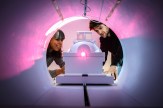For software developers, more speed and mobility
Across the globe, technology and innovation are becoming increasingly more reliant on mobility and accessibility. For software developers working on highly complex projects, that means being able to save their work quickly and instantly re-launch at the same point from another computer — a significant step developed by Northeastern University professor Gene Cooperman and a team of students in the College of Computer and Information Science.
The innovation grew out of work being done in Cooperman’s High-Performance Computing Laboratory to build and improve free, open-source software.
The software incorporates “checkpointing,” the method of saving work progress at regular intervals. Cooperman’s software—called “Distributed multi-threaded checkpointing,” or DMTCP—allows developers working in the Linux operating system to save their work to a USB drive. Later, they can pop the drive back into another computer and continue the work within seconds.
Cooperman sees parallels in this software to the issues everyday Internet users face when they need to close numerous Web browser tabs they are viewing, but don’t want to waste time and break their concentration later by searching for them all over again.
“Wouldn’t it be great if you could take (the web browser) Firefox, save your tabs, put it all on a USB key, carry it all to another computer, bring Firefox all up again and see all same tabs? That’s roughly the same benefit a software developer” will get from DMTCP, he said.
Cooperman acknowledged that software developers already are able to save their work over the Internet, while “virtual machines” can save developers’ complex work at any particular moment. But his team’s software takes checkpointing to the next level by saving only the programs necessary to the project at hand—rather than the entire operating system—thereby taking only one second to save and later reopen, compared to the couple of minutes a virtual machine may take.
“People don’t want to wait,” he explained. “They just want to do it immediately.”
Cooperman said this software also highlights the aggressive push in the technology industry to make software readily available to users on almost every medium, no matter where they are located. He pointed to the burgeoning e-commerce market, including Google’s recent announcement about launching an e-bookstore to compete with other digital platforms and devices, as an example of this trend.
His team included third-year student Greg Kerr, junior Tyler Denniston, and PhD students Ana-Maria Visan, Xin Dong and Kapil Arya. PhD students from MIT and universities in Russia and Australia also contributed to the project.
View selected publications of Gene Cooperman in IRis, Northeastern’s digital archive.





